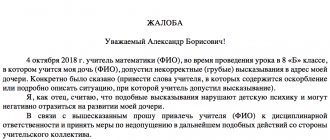You can protect a child from attacks from a teacher not only with words, but also with lawful actions, by filing a complaint with law enforcement agencies or with an experienced lawyer.
Even without knowing the laws, any adult realizes that no teacher has the right to insult and humiliate a student. The legislation of the Russian Federation clearly establishes the rights of the child while attending school, which is regulated by the Federal Law “On Education in the Russian Federation.” The student must be protected from psychological pressure and physical aggression, cannot be subjected to humiliation and insults, and also has every right to a healthy life and peaceful learning.
In addition to the rights of the student, this law explains the responsibilities of the teacher, who must adhere to legal norms, show respect and comply with the rules of professional ethics. There should be no talk of verbal and corporal punishment even if the child behaves incorrectly and violates the rules of the educational institution.
In modern schools, violations of established norms occur quite often, which leads to conflict situations and legal disputes. What to do if a teacher humiliates and insults a student in front of the whole class, where to go and what measures to take? You can get an answer on a specific situation from experienced lawyers of our company, and also involve law enforcement agencies in the proceedings.
A scandal with a teacher, counter threats and insults, as well as assault and other “domestic” measures will be qualified as a violation of the laws of the Russian Federation and will lead to complex consequences.
Where to go if a child is publicly humiliated by a teacher
No teacher has the right to shout at a child, insult and humiliate him in front of the whole class or on social networks and on the phone. This approach to the educational/educational process is non-pedagogical and requires certain measures on the part of parents and senior management.
There are several ways to protect a student from attacks from a teacher - from an official appeal to a dispute settlement commission to legal proceedings with compensation for moral damages.
The parent may request a disciplinary hearing, which may result in the teacher being fired and held accountable. The main thing is to prove that the teacher’s actions were aimed at humiliating/insulting the student’s personality.
Where to complain and what to do if a teacher calls and insults a child:
- the problem can be solved peacefully, limiting itself to a conversation with the teacher, but without threats and a raised tone;
- if a settlement agreement has not been reached, and attacks from the teacher continue, then you should write a statement to the school director (individually or collectively from several students);
- simultaneously with the appeal to the director, you can submit the same document to the Commission for Conflict Resolution in the educational institution. To prevent the complaint from being considered a conspiracy, it is better to involve other parents from your class who have complaints about the behavior and treatment of the teacher with students;
- The last resort to achieve justice is a statement of claim to the court, the prosecutor's office and the police, where the support of an experienced lawyer would not hurt.
If the situation cannot be corrected by the above methods, then the only option left is to transfer the student to another class or school.
Will you protect me? Allow your kids to complain!
I don’t know when or who came up with this, but such a belief has firmly taken root in the children’s subculture, both preschool and school. Variations of the belief: “snitching is ugly,” “informer,” “snitch-sniffer.” Moreover, this idea is conveyed not only by children to each other, but also by some parents: “Don’t complain to me! Learn to solve your problems yourself!”
There are so many psychological traumas that happen because of this “it’s not good to complain.” The child is being bullied. He cannot defend himself. And he can’t complain, because there is a ban on complaining. Some children endure bullying from classmates for years, but do not complain. Please allow children to complain!
As the owner of a small Chihuahua dog, I have the opportunity to observe the different ways she interacts with the world while walking. She chases pigeons with a loud bark, rejoicing that at least someone is afraid of her. She sniffs the Yorkie curiously, then wags her tail and jumps around, inviting him to play.
He becomes wary and freezes when a child approaches, because he does not understand what to expect from him: will he just pass by or will he try to pet him? He raises his head at me, as if asking with his gaze: “You will protect me, right?” But if my Chihuahua sees a large dog, he quickly runs away from it and asks for protection in my arms. That is, she demonstrates different response models: attack, freeze, run away, seek protection - and all this is about “protect yourself.”
To run away and hide is also to avoid being offended. It would never have occurred to me to teach a tiny Chihuahua to attack a large dog. This seems obvious. But why then, when raising children, do we so often ignore the fact that children are different, including in height and strength, and teach them a universal model of behavior: “Don’t complain. Know how to stand up for yourself. Give back."
Have you seen what that boy (offender) looks like, whom you advise to fight back? The instinct of self-preservation tells the child not to fight back. At the level of instincts, he also has different response patterns. Follow instinct or listen to parents? Should you approach your parents again with your problem? But he will hear again: “I already told you, give it to him properly and don’t complain anymore.”
The child stops complaining. The parent is convinced that the problem has been solved. But the child simply stopped complaining. Although he still cannot fight back. Tolerates.
Statement of insult
An application for insulting a student by a teacher is submitted to the police, the prosecutor's office and the school director. You can draw up the document correctly using a given template or using the help of our lawyers. What should be included in a statement of insult:
- where/to whom the document is submitted - school number, full name of the director, name of the court, police department, details of the head of the institution/prosecutor, etc.;
- information about the applicant and the victim;
- the essence of the problem – events, facts, information about the insult, etc.;
- evidence confirming the teacher’s guilt - audio/video recording, testimony of classmates and other participants in the conflict, printouts of SMS messages or pages from social networks;
- references to the law on protecting the interests of the student and requirements for holding the teacher accountable;
- signature and date.
If there was an attempt to resolve the conflict peacefully, then a copy of the complaint to the school director and information about the oral conversation should be attached to the application. If there is testimony, all papers must be certified by signatures.
Note!
Children may only be interviewed in the presence of parents, guardians and a school psychologist.
If the application is submitted to the prosecutor's office, then, based on the evidence provided, a decision is made to initiate an administrative case, the investigation period of which does not exceed 1 month. The fate of the teacher is decided by the court at the plaintiff’s place of residence.
In case of physical violence, it is recommended not to delay contacting law enforcement agencies, but to involve an experienced lawyer in the case and remove the beatings, if any, or prepare indisputable evidence of a push, blow, slap or other action of the teacher.
What is the responsibility for insulting a student?
What will happen to a teacher for insulting a student is established by Art. 5.61 Code of Administrative Offenses of the Russian Federation. According to this administrative norm, the following penalties are provided for insulting a person:
- for humiliating the honor and dignity of a person, a fine of up to 3 thousand rubles is imposed on citizens, on officials (teacher) - up to 30 thousand rubles, and on legal entities - up to 100 thousand rubles;
- insult in the media (radio channel, TV show, newspaper, Internet portal, etc.) – the fine for citizens increases to 5 thousand rubles. maximum, for officials - up to 50 thousand rubles, and for legal entities - up to 150 thousand rubles.
In addition to administrative liability, the student's parent has the right to demand compensation for moral damage. The amount of compensation depends on the degree of guilt of the offender and the consequences of the incident.
If information discrediting the child’s honor was disseminated en masse, the teacher will be held accountable under Article 128.1 of the Criminal Code of the Russian Federation - libel.
In the case of physical abuse of a child, law enforcement agencies are involved in the investigation and a simple fine will not get rid of it. These crimes include imprisonment, removal from positions and forced labor. In any situation, it is better to seek support from an experienced lawyer who will help collect evidence, avoid slander from the offender and achieve justice according to the law.
Finding the guilty
So, you learned about a conflict between a child and a teacher and decided to figure out who is really to blame for what is happening.
As a rule, 3 options are possible:
The child is to blame
Your son or daughter can beat himself in the chest with his fist and prove that “the teacher is bad, she yelled at me,” but during the conversation it turns out that the teacher raised her voice for a reason, but because the child was running along the corridor during recess or talking during the lesson.
Therefore, it is always important to find the root cause of the conflict and restore the sequence of events.
If the child is guilty, discuss with him exactly what he was wrong about, and try to convince him to apologize to the teacher, so as not to spoil the existing relationship.
The teacher is to blame
A situation may arise in which it is the teacher who is actually wrong in a conflict.
Case from practice
At the technology lesson, the girls learned to knit. Gala couldn't make even loops. The teacher took her work and showed Galina’s mistakes in front of the whole class. The girl was very upset and harbored a grudge against the teacher. At home, Galya told her mother that she did not like technology, and she would not go to these lessons anymore. No questioning yielded any results. The girl stubbornly refused to talk about what happened.
The concerned mother went to the school teacher and asked her what could have caused her daughter’s decision.
The teacher admitted her mistake and apologized to the girl the next day. Galya was taught to knit beautiful loops by her grandmother, and since then she has really enjoyed this activity.
If, after clarifying the situation, it becomes clear that the teacher played the main role in the conflict, do not rush to rush to the school with insults and accusations of the teacher’s unprofessionalism.
First, talk calmly with the teacher, tell him that the child is very upset by what happened and offer to find a way out of the current situation together. Don’t expect the teacher to immediately admit his mistake and apologize to the child. Our case from practice is the exception rather than the rule.
Be prepared for the teacher to shift responsibility for what happened to your child. In this case, make it clear that you do not doubt the teacher’s professional qualities, but you would not want a similar situation to happen again.
It is also important to convey to the student the idea that we are all human, and we can all make mistakes. The teacher had a difficult day, he was very tired and nervous, which is why the conflict occurred.
The main thing is that after the incident the child does not lose respect for the teacher and does not begin to treat him as an enemy.
The child misjudged the situation
It happens that your son or daughter confidently tells you about a conflict with the teacher, but the teacher himself is not even aware of what is happening.
In what cases is this possible:
The child is too touchy or vulnerable
Children often perceive very emotionally this or that act of the teacher.
A carelessly spoken word, a grade that is a point lower than expected, and the child immediately changes his attitude towards the teacher.
Bad grades = bad teacher
A negative attitude towards a teacher can be caused by a child’s poor academic performance. “The teacher gives me bad grades, which means he is bad,” the child thinks and hurries to share his thoughts with his parents.
The child is the “idol” of the family
If at home a child is used to hearing how smart, wonderful and generally the best he is, but the teacher does not share the parents’ opinion, moreover, she may even scold him and give him a bad grade, then resentment and tears are inevitable.
A schoolchild may sincerely not understand why this aunt doesn’t pat him on the head and call him smart for a carelessly drawn picture or crookedly written letters.
Find out how your child is doing at school: does he have conflicts with teachers, is he bullied by his peers, is he skipping classes for any reason. See his route and current location on the map, listen if necessary to what is happening around and even call a silent gadget with the “Where are my children” application.











